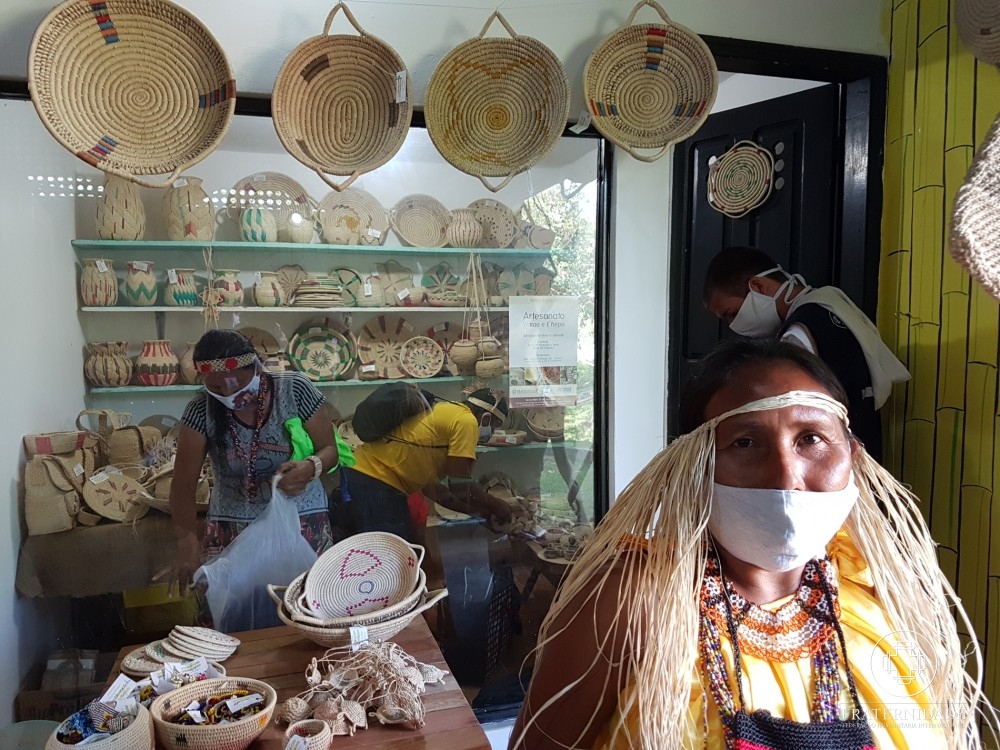Revenues obtained from the sales will be reverted to the indigenous people sheltered by Operation Welcome in Roraima
The Warao and E’ñepa Craft Center was inaugurated this Friday, October 30th, at the Artisan Nucleus of Boa Vista – capital of the State of Roraima – exclusively for the commercialization of the ancestral crafts made by Venezuelan indigenous refugees in Brazil.
This center is the outcome of a partnership between the Fraternity – International Humanitarian Federation (FIHF) and the Union of Artisans of Roraima, and has the support of the UN Agency for Refugees (UNHCR).
Indigenous women from these two ethnicities will be able to commercialize their handicrafts on the spot. The artisans live in the temporary shelters of Pintolândia (Boa Vista) and Janakoida (Pacaraima), which are part of Operation Welcome – a federal government response to the flow of refugees and migrants from Venezuela to Brazil.
The opening of this center is the result of a search for alternatives to generate income for the Venezuelan indigenous population who live in the temporary shelters managed by the Fraternity (FIHF), in partnership with UNHCR.
Through its Means of Life sector (Livelihoods), the Fraternity (FIHF) seeks to give social and economic autonomy to the refugees who are in the shelters managed by this humanitarian organization.
Currently, about a thousand refugees and indigenous migrants from Venezuela are welcomed in the Pintolândia and Janokoida shelters.
According to a recent UNHCR report on activities for Venezuelan indigenous people, more than 5,000 indigenous people from the neighboring country (from the Warao, Eñepá, Pemon, Kariña and Wayûu ethnic groups) have sought protection and assistance on the Brazilian land. Among them 3,224 are requesting the recognition of refugee status, and 100 of them have already had their requests confirmed by the government of Brazil.
“The Fraternity – Humanitarian (FFHI) seeks to intensify the humanitarian response through solutions that bring new perspectives so that the refugees can rebuild their lives,” explains the general manager of the organization, Friar Luciano.
The exodus of Venezuelans due to the political, economic and social crisis in the country is one of the largest movements of forced displacement in the Americas. According to UN estimates, about 5.5 million Venezuelans have left their country in search of protection and assistance.
In Brazil, it is estimated that about 500 thousand Venezuelans have already arrived in the country, with approximately half remaining in the country. More than 46 thousand Venezuelans have been recognized as refugees in the country, forming the largest population with this profile in Latin America.
The Importance of Artisanship
By means of artisanship, the indigenous people of the Warao and E’ñepa ethnic groups express their culture, their identity and their connection with the elements of nature.
The working with crafts in the temporary shelters for the indigenous people of Operation Welcome contributes to the generating of income for the artisans, being developed with the main objective of keeping alive the culture and the expression of the identity of these peoples, who for various reasons had to abandon their places of origin and today live in a very different context from their traditional ways of life.
Ojidu, the Warao Tree of Life
The whole life and livelihood of the Warao people is connected to the Buriti tree, from which they produce food, handicrafts, clothing and houses.
“We consider the Buriti tree as the forest of our land – a sacred tree – since our ancestors. It is part of the life of the Warao Indians as the source of many types of food plus the fibers, with which we make handicrafts,” says the indigenous and artisan Ensismar, resident of the Pintolândia shelter.
This deep relationship is explained in their mythology.” A long time ago, the Warao met a man named Ojidu. He gave the Warao everything they needed: nets, fruits, flour. Everything the Warao needed, he supplied. One day a very jealous man killed him, and he became a Buriti tree (Ojidu), our tree of life. It gives us everything we need,” explains the artisan.
E’ñepa, Indigenous People
With hard work and zeal, the E’ñepa indigenous people handle seeds in the making of beads, necklaces and bracelets, carve graphics and paint the treated wood that gives rise to decorative bows and arrows.
Being a minority inside the shelters, they are more shy and silent, and seek to maintain their traditions and essence: from colorful clothes to festivities.














